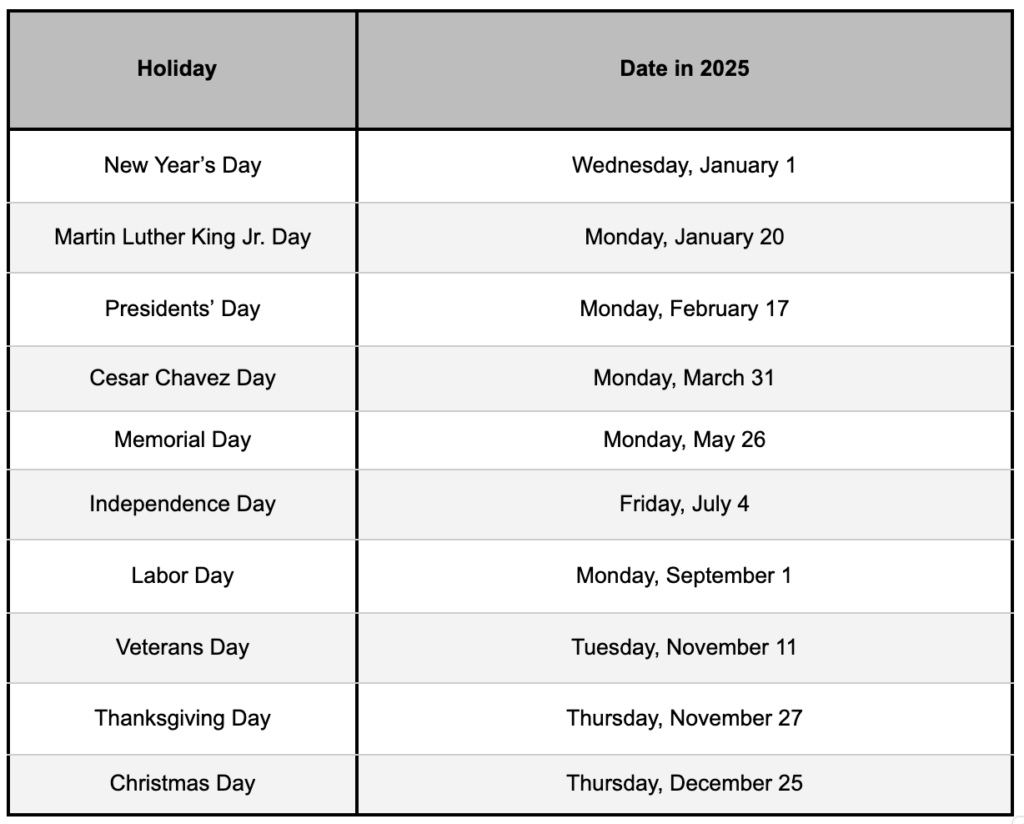Knowing about state holidays is crucial for both workers and employers. For employees, it means understanding when they might have a break or qualify for extra compensation. For employers, state holidays provide an opportunity to align with labor-friendly practices while maintaining a productive and supportive work environment. In California, holidays are not just about taking time off—they represent cultural values and work-life balance.
What Are California State Holidays?
In 2025, California recognizes several official state holidays, most of which result in closures for state offices and schools. However, private employers are not obligated to observe these holidays. Here’s a quick overview of the dates for the year
Here are some commonly observed state holidays:

These holidays primarily mean time off for government workers, but private-sector employees should check their workplace policies for details on time off or holiday pay.
California’s Approach to Paid Holidays
California does not require private employers to provide paid time off or additional compensation for working on holidays. This flexibility allows businesses to create their own holiday policies based on their operational needs.
Key Points for Workers and Employers
- No Mandatory PTO: Private-sector employees do not automatically qualify for paid holidays unless outlined in their company’s policies.
- Optional Holiday Pay: Some employers voluntarily offer premium pay (such as time-and-a-half) for holiday shifts, but it’s not required by state law.
- Union Agreements: Workers covered by a collective bargaining agreement may have specific rights to paid time off or additional compensation for holidays.
Without a state mandate, it’s important for employees to be proactive in understanding their workplace benefits and for employers to communicate their policies clearly.
Companies with PTO Policies for Holidays
You may wonder which companies in California offers PTO for California holidays.Here are a few examples:
- Google: Employees benefit from a robust PTO plan that includes major state and federal holidays, along with personal time for other observances.
- Kaiser Permanente: Staff members enjoy paid holidays and floating days off for flexibility.
- Bank of America: Offers its workforce paid holidays plus an additional “day of gratitude.”
- Patagonia: This company takes employee well-being seriously, even closing early on holidays to encourage outdoor activities.
- Adobe: Provides both fixed holidays and “well-being days” for employees to take additional time off.
Remember to ask your employer if there is a PTO Policy at your Company.
Tips for Employees and Employers in 2025
For Employees:
- Check Your Policies: Know whether your company provides paid holidays, holiday pay, or time-and-a-half for holiday work.
- Request Time Off Early: Popular holidays like Thanksgiving and Christmas often require advance notice to secure time off.
- Use Floating Holidays Wisely: If your employer offers them, save floating holidays for times that matter most to you.
For Employers:
Stay Competitive: With many employers offering PTO or other perks, aligning holiday benefits with industry standards can help attract and retain talent.
Set Clear Expectations: Clearly communicate holiday schedules, PTO policies, and any extra pay for holiday shifts.
Consider Employee Morale: Offering even small benefits for holiday work, like early closure or holiday bonuses, can boost team morale.
FAQs About California State Holidays for Workers and Employers
Do California employers have to provide paid time off for state holidays?
No, private employers in California are not required by law to offer paid time off for state holidays. It is up to individual employers to decide whether they provide PTO, holiday pay, or time off. Public sector employees, however, typically get these holidays as paid days off.
Can my employer make me work on a state holiday?
Yes, employers can schedule employees to work on state holidays unless your employment contract or company policy states otherwise. However, standard labor laws, such as overtime pay for working over 8 hours in a day or 40 hours in a week, still apply.
Do I get extra pay for working on a holiday in California?
California labor laws do not require extra pay for holiday work unless it qualifies as overtime. Some employers voluntarily offer premium pay, such as time-and-a-half or double pay, as an incentive for working during holidays.
What are floating holidays, and how can they be used?
Floating holidays are flexible paid days off that employees can use at their discretion, often for personal or cultural observances not recognized as official holidays. Employers offering floating holidays typically allow workers to schedule these days in advance to meet their personal needs.
Are unionized employees entitled to paid holidays?
Unionized employees often have paid holidays and other benefits outlined in their collective bargaining agreements (CBAs). These agreements usually include provisions for holiday pay, time off, or premium rates for working during holidays.
Can I use vacation time for state holidays if my company doesn’t provide paid time off?
Yes, if your employer allows it. Many companies let employees use accrued vacation or PTO to take a day off for state holidays when paid holidays are not offered.

